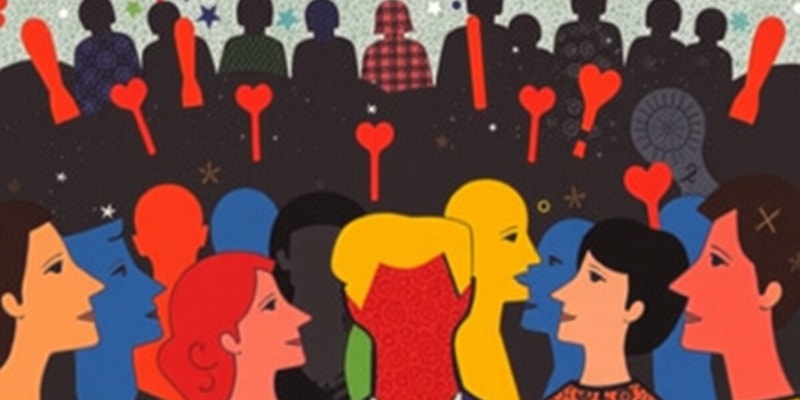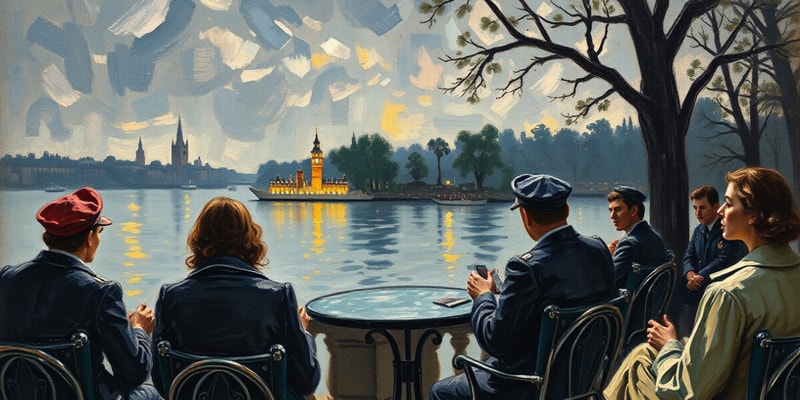Podcast
Questions and Answers
What is a major characteristic of clarity in question design?
What is a major characteristic of clarity in question design?
What does weighting data in polling aim to correct?
What does weighting data in polling aim to correct?
Which of the following is an example of a straw poll?
Which of the following is an example of a straw poll?
Which of the following describes a key element of specificity in question design?
Which of the following describes a key element of specificity in question design?
Signup and view all the answers
What is the primary function of interest groups?
What is the primary function of interest groups?
Signup and view all the answers
What are material incentives in the context of interest groups?
What are material incentives in the context of interest groups?
Signup and view all the answers
What is the purpose of the Lobbying Disclosure Act?
What is the purpose of the Lobbying Disclosure Act?
Signup and view all the answers
What is a characteristic of purposed incentives for interest groups?
What is a characteristic of purposed incentives for interest groups?
Signup and view all the answers
What challenge do interest groups face in recruiting members?
What challenge do interest groups face in recruiting members?
Signup and view all the answers
What does the term 'Revolving Door' refer to in the context of lobbying?
What does the term 'Revolving Door' refer to in the context of lobbying?
Signup and view all the answers
What is a key feature of Political Action Committees (PACs)?
What is a key feature of Political Action Committees (PACs)?
Signup and view all the answers
What was the significance of the Citizens United v. FEC ruling in 2010?
What was the significance of the Citizens United v. FEC ruling in 2010?
Signup and view all the answers
What is the Iron Triangle in political terms?
What is the Iron Triangle in political terms?
Signup and view all the answers
Which of the following statements about Super PACs is accurate?
Which of the following statements about Super PACs is accurate?
Signup and view all the answers
What is the primary purpose of exit polls?
What is the primary purpose of exit polls?
Signup and view all the answers
What can be a significant issue caused by exit polls as highlighted in the 2000 election?
What can be a significant issue caused by exit polls as highlighted in the 2000 election?
Signup and view all the answers
What tactic do push polls use to influence respondents?
What tactic do push polls use to influence respondents?
Signup and view all the answers
What is the 'Bradley Effect' in polling?
What is the 'Bradley Effect' in polling?
Signup and view all the answers
Which type of poll is known for using leading questions to sway opinions?
Which type of poll is known for using leading questions to sway opinions?
Signup and view all the answers
How did the Citizens United v. FEC ruling change the landscape of political spending?
How did the Citizens United v. FEC ruling change the landscape of political spending?
Signup and view all the answers
What is a significant criticism of the Iron Triangle in political advocacy?
What is a significant criticism of the Iron Triangle in political advocacy?
Signup and view all the answers
What factors may be considered when creating a representative sample for polling?
What factors may be considered when creating a representative sample for polling?
Signup and view all the answers
How does political socialization begin in individuals?
How does political socialization begin in individuals?
Signup and view all the answers
Which of the following best defines beliefs in the context of political opinions?
Which of the following best defines beliefs in the context of political opinions?
Signup and view all the answers
What is the relationship between public beliefs about equality and political socialization?
What is the relationship between public beliefs about equality and political socialization?
Signup and view all the answers
Which aspect is vital in ensuring that polling methods are effective?
Which aspect is vital in ensuring that polling methods are effective?
Signup and view all the answers
What distinguishes push polls from traditional opinion polls?
What distinguishes push polls from traditional opinion polls?
Signup and view all the answers
Which of the following best describes leading questions used in polls?
Which of the following best describes leading questions used in polls?
Signup and view all the answers
What is one primary reason why the Bradley Effect may occur in polling?
What is one primary reason why the Bradley Effect may occur in polling?
Signup and view all the answers
What is a consequence of having a large margin of error in polling?
What is a consequence of having a large margin of error in polling?
Signup and view all the answers
Which method is considered effective for capturing diverse demographics in surveys?
Which method is considered effective for capturing diverse demographics in surveys?
Signup and view all the answers
Why is it important for polling data to be weighted?
Why is it important for polling data to be weighted?
Signup and view all the answers
Which statement best describes the role of lobbying in the political system?
Which statement best describes the role of lobbying in the political system?
Signup and view all the answers
Study Notes
Public Opinion
- Most people base their political opinions on their beliefs and attitudes, which begin to form in childhood.
- Beliefs are closely held ideas supporting values and expectations about life and politics.
- Examples of shared beliefs include equality, liberty, freedom, and privacy.
- Beliefs are acquired through upbringing in a country that values these principles.
Political Socialization
- Political socialization is the process of training to understand and participate in a country's political system, starting from a young age.
- Agents of political socialization include family, friends, school, religious institutions, and media.
- Specific examples include opposition to abortion based on Christian upbringing, support for political parties based on family history, and support for agricultural subsidies due to rural upbringing.
Polling and Public Opinion
- Collecting public opinion through polling and interviews is an aspect of American political culture.
- Polling refers to the scientific methods and techniques used to measure public opinion.
Sample Design
- Representative samples closely match the demographic composition of the national population (age, gender, race, education).
- Random sampling methods like random digit dialing and stratified sampling are used to avoid bias.
- Sufficient sample size (typically 1,000+ respondents) is crucial to achieve a ±3% margin of error in national polls.
Question Design
- Questions should be clear, unbiased, and avoid leading language.
- Questions should be specific and focus on the topic of interest without ambiguity.
- Likely voter filters can be used to target polls toward those most likely to vote..
Methodology and Analysis
- Survey modes (phone, online, face-to-face) should be appropriate for the target population and mixed-mode surveys can be effective.
- Data should be weighted to correct for overrepresentation or underrepresentation of certain demographics.
- Understanding and reporting the margin of error are essential for accurate results.
Types of Polls: Straw Polls
- Informal polls conducted to collect general public opinion data without a random sampling process.
- Often conducted by newspapers or social media.
Types of Polls: Exit Polls
- Polls taken as people leave polling places immediately after voting.
- Can provide early projections of election outcomes, but can also be inaccurate and misleading.
Types of Polls: Push Polls
- Polls that use leading questions to influence the respondent's opinion or response.
- The goal of a push poll is to shape opinions rather than collect neutral information.
Types of Polls: Tracking Polls
- Polls that track data over time to detect changes in public opinion on issues and individuals.
- Significant for capturing daily shifts in public opinion.
- A common issue with tracking polls is the “Bradley Effect,” or a scenario where voter honesty is not fully assured.
Public Opinion and Interest Groups
- Interest groups are groups bound by a common interest that seek to use the political system to attain policy goals by persuading government officials.
- Individuals express support for their values and beliefs by supporting interest groups.
Types of Interest Groups: Economic Interest Groups
- Seek to influence policy for the pocketbook; examples include the American Medical Association, labor unions, and trade associations.
Types of Interest Groups: Equal Opportunity Interest Groups
- Seek to represent people based on factors like race, gender, sexual orientation, and age; these groups often fight for equal opportunity and challenge discrimination.
Types of Interest Groups: Public Interest Groups
- Seek policy changes based on what's best for the public; examples include pro-life and pro-choice groups, the marijuana legalization movement.
Benefits of Interest Groups
- Interest groups strive to attract members by offering material incentives, solidary incentives, and purposive incentives to overcome collective action problems.
Lobbying and Interest Groups
- Lobbying is the effort to persuade government officials to adopt specific policies.
- Lobbyists are professionals who represent interest groups before policymakers.
- The Lobbying Disclosure Act requires registration with the federal government for those representing interest groups.
- The "revolving door" phenomenon refers to officials leaving government positions to lobby for private interest groups.
What are PACs?
- Political Action Committees (PACs) are organizations that raise and spend money to influence political campaigns or elections.
- The Federal Election Campaign Act of 1974 established rules for PACs, allowing them to directly contribute to candidates but with limits.
- In 2010 Citizens United v. the FEC ruling, the court determined political spending is protected free speech and this ruling led to creation of Super PACs.
- Super PACs can spend unlimited amounts of money to support or oppose candidates; however, they cannot coordinate with candidate's campaigns.
Studying That Suits You
Use AI to generate personalized quizzes and flashcards to suit your learning preferences.
Related Documents
Description
Explore the key concepts of public opinion, political socialization, and the factors that shape beliefs and values in politics. This quiz delves into how upbringing and social interactions influence political perspectives and participation. Test your understanding of polling and its significance in American political culture.




